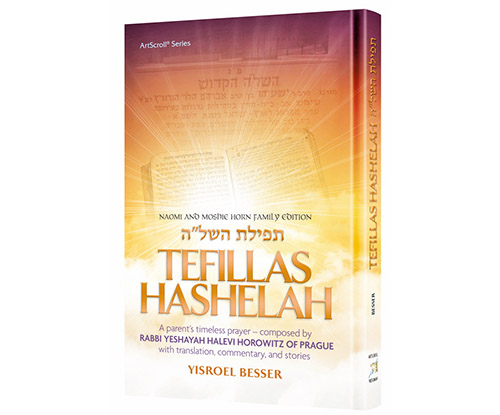
Highlighting: “Tefillas HaShelah” by Yisroel Besser. Mesorah Publications Ltd. 2023. Hardcover. 130 pages. ISBN-13: 978-1422633380.
(Courtesy of Artscroll) Tefillas HaShelah is the prayer recited by generations of parents, asking Hashem for righteous, successful and happy children. Written over 400 years ago by Rav Yeshaya Halevi Horowitz, every word of the tefillah offers us insights and lessons for life.
In ArtScroll’s new Tefillas HaShelah, bestselling author Yisroel Besser uses stories and classic commentaries to bring the tefillah to life, conveying our hopes and dreams that our children taste the sweetness of Torah and experience the joy of Jewish living – aspirations that the holy Shelah packed into his timeless prayer.
Timeless Tefillah
In addition to the formal siddur and nusach haTefillah, there are various tefillos that, although not mandatory, people choose to recite. Several were composed by Chazal, others by gedolei Yisrael throughout the ages, and sometimes people feel most comfortable expressing their deepest desires and hopes in their natural language, communicating with the Creator freely.
Depending on mesorah, personality and need, people vary, but somehow there is an almost universal consensus here, in the words of the Tefillas HaShelah. Perhaps this is because more than anything else, every parent wants what is best for his or her children, and the best is encompassed by all that the heilege (holy) Shelah packed into his timeless tefillah. Those who are not yet parents find that each line in this tefillah articulates the longing and hope they feel.
Since the time the Shelah Hakadosh put words to the dreams and aspirations of parents four centuries earlier, the world has changed, then changed again. Different times call for different needs, and the Shelah Hakadosh enabled parents to express different hopes with the words of this tefillah. There were no doubt years when parents pleaded that their children find a safe refuge from the pogroms and massacres claiming Jewish lives. There were certainly times when parents closed their eyes and wished that the allure of Haskalah, the dogma that had stolen the hearts and minds of so many young people, should spare their children, leaving them pure and unsullied.
It is not difficult to imagine the shtetel water carrier finishing his rounds for the day, slipping the pails off his tired shoulders and heading straight to shul to say the tefillah. His daughter was getting older; where would he find a suitable young man in the small town? And which young man would choose to marry the daughter of a poor water-carrier?
Perhaps these words of the Shelah — the inherent belief in a system in which each soul that is created shares their soul with another — allowed the water carrier and his wife one evening free of worry and stress.
A century ago, parents who had survived one war, on the cusp of another that they could not even fathom, worried about their children: Did they have a chance in a world filled with such turmoil and fear?
In America, parents who had emigrated wondered if their children, swallowed up by this new land of opportunity, would even know what Shabbos meant. Surely, they davened for those children as if their lives depended on it — because their lives did depend on it.
(The Chazon Ish foretold of the great wave of teshuva that would sweep across Eretz Yisrael, explaining that a generation of mothers had wept for their children when they lit Shabbos candles, davening that their children — drawn astray by an ideology, an opportunity, a cause, a dream — should come back. The tears of a mother, said the Chazon Ish, are never in vain, and those tears became the river that swept back the grandchildren, whose neshamos were pulled by invisible cords.)
Our own grandparents survived and bravely tried to rebuild. They were Jews who understood that forgetting what they had seen would allow them to remember, who found ways to smile at their children even as every infant and toddler resembled someone who had never made it out. They worked to shut out the echo of desperate cries until nighttime, when the house was quiet — then, they whispered a tefillah that their children would be able to grow up in tranquility and calm.
And here we are, parents in a generation of plenty. Between the lines of the Tefillas HaShelah, our fears and worries are addressed, our deepest hopes expressed. We are reminded of who we are, where we come from, and why we are here, inspired to sing the song in a way that our children will not just learn it, but live it. May our sons taste the sweetness, our daughters experience the joy.
At the time the Shelah Hakadosh wrote the tefillah, parents hoped their children would live. Today, our hope is precisely the same: that our children live. Really live.













